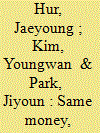| Srl | Item |
| 1 |
ID:
152892


|
|
|
|
|
| Summary/Abstract |
This paper is designed to understand the relationship between states and nongovernmental organizations (NGOs), especially foreign aid policy and the field activities of NGOs. In this study, I argue that NGOs influence states’ foreign aid policy behaviors toward other states directly, functioning as information providers and lobbying groups. By applying theoretical arguments to the field of international development, the influence of NGOs on states’ decisions about foreign aid is analyzed with the case of the United States. A new time-series cross-sectional data set of the activities of US-based NGOs in developing countries is constructed. This study shows that as the number of US-based NGO field operations in developing countries increases, that country is significantly more likely to receive higher amounts of aid from the United States. NGOs that have longer operations in developing countries are also more effective at lobbying the United States to provide more foreign aid.
|
|
|
|
|
|
|
|
|
|
|
|
|
|
|
|
| 2 |
ID:
155833


|
|
|
|
|
| Summary/Abstract |
In this study we suggest new approaches to conceptualizing South Korean aid to North Korea as equivalent to official development assistance (ODA) by looking at its historical background and present situation, as well as related laws. We review the characteristics and development of South Korean aid to North Korea, compare it to ODA, and suggest an innovative way of conceptualizing it as ODA. In particular, we assert that if South Korean aid to North Korea were considered ODA, South Korea would be able to effectively assist North Korea and become a more influential and responsible donor in international society.
|
|
|
|
|
|
|
|
|
|
|
|
|
|
|
|
| 3 |
ID:
179267


|
|
|
|
|
| Summary/Abstract |
India is the recipient of substantial aid flows but also a nuclear-armed power and an emerging donor. Why have developed countries provided aid to one of the fastest-growing major economies in the world? Answering this question requires understanding the underlying determinants of these aid flows. Using data from 1960 to 2015, the domestic conditions of India and the external conditions of donors are empirically explored with time-series analysis and panel-data analysis. We find that during the Cold War India received more foreign aid from donors with a larger volume of trade and arms transfers, but from 2000 to 2015 the effect of arms transfers declined while countries with high trade volumes continued to give more aid. Although these findings broadly support the realist interpretation of aid, we conclude that post–Cold War structural shifts in the international aid regime and defense industries need to be considered by future researchers.
|
|
|
|
|
|
|
|
|
|
|
|
|
|
|
|